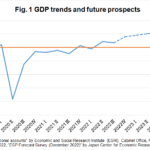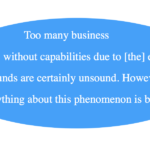As Japan hurtles toward the “2025 Digital Cliff,” its digital shortcomings brought into sharp focus by the novel coronavirus, accelerating the “digital transformation” (DX) needed to bring about Society 5.0 has become an urgent policy concern. Sano Kentaro reports.

The digitization of the marketplace, one of the core elements of the Growth Strategy, was discussed at the Council on Investments for the Future on July 3, 2020. From left: Nishimura Yasutoshi, Minister of State for Economic and Fiscal Policy; Prime Minister Abe Shinzo; and Suga Yoshihide, Chief Cabinet Secretary. CABINET PUBLIC RELATIONS OFFICE PHOTO
In September 2019, the government of Japan established the Headquarters for Digital Market Competition and discussions aimed at developing draft legislation regarding digital markets started within the Digital Market Competition Council. In March 2020, a bill was proposed to the Diet and in June this led to the introduction of the Act on Improving Transparency and Fairness of Transactions of Digital Platform Operators and the Amendment Act of the Act on the Protection of Personal Information.
Behind the enactment of these laws is an oligopolistic digital advertising market typified by GAFA (Google, Apple, Facebook and Amazon), the black boxing of complex systems and issues surrounding service quality. Enhancing the fairness and transparency of digital advertisement markets and securing free choice for consumers and business operators have been big challenges (see box at end of article). Regarding this, the Japan Business Federation, or Keidanren, has advised that, although securing the transparency and fairness of transactions between digital platform operators and business users is central in the formulation of rules for digital markets, the cautious development of rules is important from the perspective of promoting the digital economy because the excessive tightening of regulations may cause stagnation in digital innovation.
As a result, these laws have been assessed as having content equivalent to the EU’s Online Platforms Regulation, the regulation promoting fairness and transparency for business users of online intermediation services, because they promote the development of rules, the digital transformation (DX) of businesses and the creation of frameworks for individuals and corporate bodies to control data themselves.
The COVID-19 pandemic, which began amid the deliberation of the laws has propelled their speedy enactment. In enacting measures to respond to COVID-19, it became evident that Japan, in both the public and private spheres, lagged far behind the rest of the world in terms of digitalization. Japan has come to realize this and to feel a sense of urgency, worried that, in their reaction to COVID-19, the world is accelerating its digitalization and that the gap between Japan and the rest of the world is likely to expand further.
There are several other factors. An OECD report dated September 28, 2017, for example, focused on the digital transformation of the economy and society. The G7 Science Ministers’ Communiqué made the following statement.
As clearly stated in the OECD document on “The Next Production Revolution: Implications for Governments and Business,” the digital transformation will have an impact on our societies, since it encompasses and cuts across all major NPR related technologies e.g., robotics, additive manufacturing, materials, big data analytics, precision medicine, synthetic biology, and artificial intelligence. Incorporating digital education into all forms and levels of education and professional training will help to form a new generation of researchers suitably equipped to face the complex challenges of the NPR and will help today’s researchers adapt to the challenges posed by the NPR.
Regarding the issue of Japan’s lagging digital transformation (DX), there is the problem of a “digital cliff” as also discussed by Kojima Akira in the Economy column of this issue. In the report published by the Ministry of Economy, Trade and Industry (METI) in September 2018 entitled “DX Report: Overcoming of ‘2025 Digital Cliff’ Involving IT Systems and Full-fledged Development of Efforts for DX,” it describes the current situation in Japan by stating, “new businesses have been appearing in all industries, employing novel business models based on game-changing digital technologies that disrupt established markets. Amid this trend, Japanese companies are required to swiftly advance DX to maintain or enhance their competitiveness.” It goes on to state, “in this situation, some companies have launched efforts (e.g., establishment of a new department responsible for digital technologies) in order to address and advance DX. However, many such companies face difficulties in actually reforming their businesses through these efforts. While they invest in the efforts to some extent (including taking concrete steps to investigate potential strategies), the success of their implementation has been inconsistent.”
 According to the Report, as the existing systems of many companies tend to be overly-specific and outdated, there are some problems such as (1) benefits derived from introduction of new digital technologies may be limited since data utilization and collaboration are also limited, (2) they may face further maintenance cost hikes (due to exponential increases in future technical debt) and (3) higher long-term security risks caused by a shortage of human resources that are trained to maintain the existing systems.
According to the Report, as the existing systems of many companies tend to be overly-specific and outdated, there are some problems such as (1) benefits derived from introduction of new digital technologies may be limited since data utilization and collaboration are also limited, (2) they may face further maintenance cost hikes (due to exponential increases in future technical debt) and (3) higher long-term security risks caused by a shortage of human resources that are trained to maintain the existing systems.
This is the 2025 Digital Cliff and the problems it brings will be quite serious. The shortage of IT professionals will expand from approximately 170,000 persons in 2015 to approximately 430,000 in 2025. There will be an insufficient supply of advanced IT professionals. It will become impossible to hire enough professionals with knowledge of old programming languages. Maintenance support for SAP Enterprise Resource Planning (ERP) will end and a review of the entire system will become necessary. The ratio of IT service markets and digital markets will reach 6:4, compared to 9:1 in 2017.
 The job of METI is to sort the existing systems that have become complex or have turned into black boxes, and decide which will be disposed of, which will be left in ‘as-is’ condition and so on and also it will have to renovate the systems that are necessary for the realization of DX by 2025, aiming to achieve a rise of 130 trillion yen in the real GDP by 2030. The Ministry plans to raise the annual average growth rate of the IT industry from 1% to 6% by means such as raising the budget ratio, the amount of IT investment to GDP, to 6:4, which is 1.5 times the current level, from 8:2, where it stood in 2017, shortening the time necessary for releasing additional services from several months to several days, raising the IT professional distribution ratio (users(all industries):vendor) from 3:7 to 5:5 and doubling the average annual income of IT professionals compared to their present compensation.
The job of METI is to sort the existing systems that have become complex or have turned into black boxes, and decide which will be disposed of, which will be left in ‘as-is’ condition and so on and also it will have to renovate the systems that are necessary for the realization of DX by 2025, aiming to achieve a rise of 130 trillion yen in the real GDP by 2030. The Ministry plans to raise the annual average growth rate of the IT industry from 1% to 6% by means such as raising the budget ratio, the amount of IT investment to GDP, to 6:4, which is 1.5 times the current level, from 8:2, where it stood in 2017, shortening the time necessary for releasing additional services from several months to several days, raising the IT professional distribution ratio (users(all industries):vendor) from 3:7 to 5:5 and doubling the average annual income of IT professionals compared to their present compensation.
The METI proposes that Japanese companies, including user companies and vendors, across all industries should share the recognition of the “2025 Digital Cliff” and the “Scenario for achieving a DX,” and they should achieve the scenario in parallel with addressing their challenges, while the government of Japan should develop business environments to support the scenario as a target. As a part of its measures for promoting DX, the Ministry enacted a policy of (1) establishing metrics to make efforts visible and objective analysis schemes, (2) formulating “DX Promotion System Guidelines,” (3) taking measures for reducing costs and risk in establishing IT systems to achieve DX, (4) building new relationships between user companies and vendors and (5) developing and securing human resources trained in DX.
Initiatives for DX with the Aim of Achieving Society 5.0
In its Policy Proposal “Digital Transformation — Opening Up the Future through Co-creation of Values” dated May 19, 2020, the Keidanren stated its understanding of the issues surrounding DX as follows.
Advancement in digital technology has brought about rapid social transformation—namely, digital transformation (DX). In an era of unpredictable future, now is the time to take up the challenges of the unknown in various fields. As of May 2020, mankind is facing the crisis of COVID-19. There have actually been various attempts to stem the pandemic with digital technology. COVID-19 has brought about significant changes in the global situation and people’s mentality. In addition to COVID-19, the world faces a mountain of problems. Striking a balance between economic growth and sustainability is a major social concern. In this situation, Japan is proposing “Society 5.0” as the concept of a social model that creates values while solving problems. In spite of Japan having entered the new Reiwa era, there are still deep-rooted social structures and practices from the preceding Showa and Heisei eras. It is necessary to achieve Japanese-style DX in order to promote bold changes characterized as Reiwa Reformation and open up a new future.
 On June 16, 2020, Nishimura Yasutoshi, the Minister of State for Economic and Fiscal Policy, pointed out that the COVID-19 pandemic has accelerated digitalization significantly around the world and that various fields are expected to see accelerated innovation, while there are also risks such as the development of an oligopoly in digital markets and privacy concerns caused by the centralized management and use of data by mega platforms. He then said, “Japan aims to realize more competitive digital markets, which form the foundation of Society 5.0, to benefit individuals and organizations on the basis of data governance and trust.
On June 16, 2020, Nishimura Yasutoshi, the Minister of State for Economic and Fiscal Policy, pointed out that the COVID-19 pandemic has accelerated digitalization significantly around the world and that various fields are expected to see accelerated innovation, while there are also risks such as the development of an oligopoly in digital markets and privacy concerns caused by the centralized management and use of data by mega platforms. He then said, “Japan aims to realize more competitive digital markets, which form the foundation of Society 5.0, to benefit individuals and organizations on the basis of data governance and trust.
The government of Japan will promote DX to allow a diverse array of players to participate, with the goal of establishing a “Trusted Web,” a framework under which individuals and businesses that originally possessed data can control access to that data and manage the value created from the use of data.
There are a number of challenges. At the June 16, 2020 meeting of the Digital Market Competition Council, a member from the private sector, Kyoto University’s Professor Ida Takanori, pointed out that “the Japanese people have been asked to transition to a new lifestyle due to COVID-19 and there is no time to spare with respect to the necessity of digital transformation. In the new, next-generation Trusted Web technology, the compatibility between autonomous and dispersed information processing in edge nodes and lower-level devices and consumer privacy protection will be a significant political challenge.” Dr. Kitano Hiroaki, the President & CEO of Sony Computer Science Laboratories, Inc., another member from the private sector, praised the prompt responses of Apple and Google to COVID-19 and said, “it is extremely important to promote digitalization in the health and medical field, and to build transparency and reliability into the platforms that support data sharing and advanced data usage in a way that is visible to society in the future. It is urgently necessary to discuss this with stakeholders, including platform operators, service providers and the governments of G7 countries.” Keio University’s Professor Shirasaka Seiko stated that we are in the middle of an irreversible change. She pointed out that in the era of Society 5.0, to coexist with COVID-19, the direction that digital markets should urgently move in should be toward the realization of human-centered DX and a free flow of data that enables trust.
The government of Japan will enact the Act on Improving Transparency and Fairness of Transactions of Digital Platform Operators and the Amendment Act of the Act on the Protection of Personal Information, which have just been passed, and work from various angles toward the realization of a new data governance or Trusted Web based on the Interim Report on the Evaluation of Competition in the Digital Advertising Market and the Report on Medium-Term Vision on Competition in Digital Market which was compiled on the same day.
Society 5.0 is a keyword for the Osaka-Kansai Expo 2025, along with the SDGs. Expo 2025 will be a showcase for Society 5.0 and for DX.
SANO Kentaro is a freelance writer.
Note: This article first appeared in the July/August 2020 issue of the Japan Journal.











